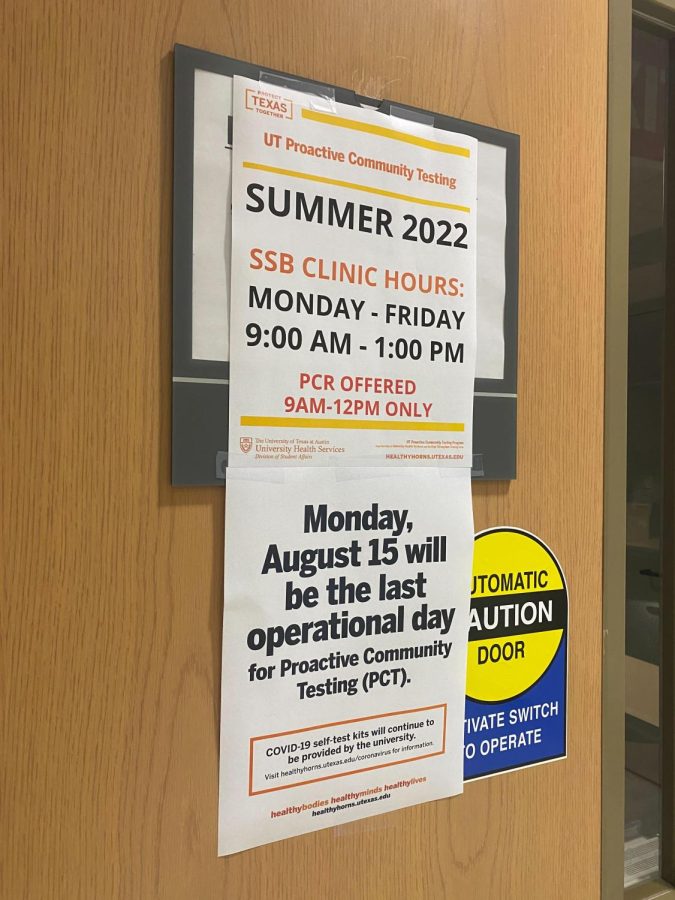As UT discontinues PCT, some students worry about COVID-19 testing resources
August 13, 2022
As students return to campus for the beginning of the fall semester, UT posted signs in the Student Services Building stating the proactive community testing program would no longer be operational starting Aug. 15. However, the University will provide up to four self-testing kits at a time for distribution to UT community members, according to an email sent Monday.
“This was an effort to improve access to testing for the students and faculty in their homes or in their place of residence so they are able to go ahead and start isolating sooner,” said Amy Young, chief clinical officer for UT Health Austin.
Prior to the Aug. 8 email, which did not mention the PCT discontinuation, members of the UT community could receive up to two tests at a time at distribution hubs around campus. To meet the demand for at-home testing as PCT is discontinued, Young said the University currently has 100,000 test kits on hand and can request more as the supply is depleted.
“It would be our hope that students, staff and faculty would only pick up tests once their supply is exhausted,” Young said.
As the over two-year-long program comes to an end, some members of the UT community said they have concerns about no longer having access to PCT and solely relying on at-home tests. Additionally, some students said they wish UT had made better efforts to notify the community about the program ending.
“There’s just a lack of transparency, which I think is really unfair to students, especially because I found out that they were discontinuing it through a Twitter post,” said biology senior Ashlynn Barrera.
Philosophy junior Gabriela Gonzalez said they are worried students may run out of their own supply of self-tests quickly while having COVID-19 because it is always unsure how long the symptoms or testing positive will last.
“As long as the pandemic continues, I feel like it’s unnecessary to discontinue (PCT),” Gonzalez said.
Neuroscience junior Emma Babaian said in addition to losing this testing resource, the PCT offered educational opportunities for the UT community.
“It’s been great in terms of research, jobs and educating people,” Babaian said. “UT has amazing tools and capacities for things like (the PCT). I don’t see what they gain from stopping it.”
Nursing sophomore Jasmine Pearson said she used to get a PCT test twice a week to ensure she didn’t have COVID-19 while living with her grandma. Going into this fall, Pearson is concerned about losing testing resources, particularly at a time when COVID-19 academic accommodations may not be as flexible.
“A lot of teachers aren’t going to be offering the option to do classes remotely or have a recorded class so (students) don’t have to be there if they’re uncomfortable,” Pearson said.
In Monday’s email, the University advised students to contact professors for “alternative arrangements” if a medical emergency prevents them from attending class. Students were also advised to complete a class absence notification request through Student Emergency Services. The email did not mention if professors were required to provide accommodations.
The Centers for Disease Control and Prevention released updated guidance Thursday in time for students to return to campus that focuses on individual choice. Students are not expected to quarantine after being exposed to the virus if they do not test positive, and it is no longer recommended to test if asymptomatic.
Bennett Burke, a history and political communications senior, said the updated guidance by the CDC concerns him because he believes the recent decisions are based more on a lack of political will than science. Burke said compared to the U.S., other countries are still stringent about offering tests, masks and other services for people.
“With UT doing away with PCT and then the CDC putting out this unscientific guidance, we’re gonna see a lot of people get sick,” Burke said.












